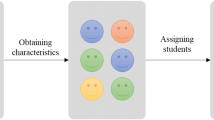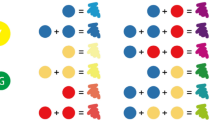Abstract
The aim of this study is to analyze the effect of different conditions of face-to-face learning on the participation and learning of students in the virtual community. In particular, we analyze the effect of collaboration vs intergroup competition learning on interdependence, regulation of socio-cognitive conflict, participation, and the quality of the contributions in a virtual learning platform. This study took place in an educational research course. The participants in the full investigation were 36 (94.44% females) undergraduates enrolled in the subject of educational research, which was part of a 4-year social education degree program. A Latin Squares design was applied to carry out the full investigation. The results show that conditions of collaboration without competition in face-to-face environments facilitate better quality of learning to a greater extent. In addition, there are no benefits of intergroup competition over individual competition learning. Thus, in this study, collaborative learning designs without any competition could be considered more consistent with the goal that underpins the main right to education: Each student is able to achieve what he has to achieve, taking advantage of the abilities of each and every agent in the learning community (teacher and students) to do so. These results are not consistent with previous studies. We suggest that characteristics of the sample could explain these differences between studies.




Similar content being viewed by others
Explore related subjects
Discover the latest articles, news and stories from top researchers in related subjects.References
Álvarez RB, Mayo IC (2009) Las tecnologías de la información y la comunicación en la educación superior. Estudio descriptivo y de revisión. Revista Iberoamericana de Educación 50(7):1–12
Arnab S, Nalla M, Harteveld C, Lameras P (2015) An inquiry into gamification services: practices, experience and insights. In: Proceedings of the international gamification for business conference, 21–22 Sept 2015, Aston, Birmingham, UK.
Baer M, Leenders RTAJ, Oldham GR, Vadera AK (2010) Win or lose the battle for creativity: the power and perils of intergroup competition. Acad Manag J 53(4):827–845. https://doi.org/10.5465/amj.2010.52814611
Basheri M, Munro M, Burd L, Baghaei N (2013) Collaborative learning skills in multi-touch tables for UML software design. Int J Adv Comput Sci Appl 4(3):60–66
Biggs JB, Collis K (1982) Evaluating the quality of learning: the SOLO taxonomy. Academic Press, New York
Brown N, Smyth K, Mainka C (2006) Looking for evidence of deep learning in constructively aligned online discussions. In: Banks S, Hodgson V, Jones C, Kemp B, McConnell D, Smith C (eds) Proceedings of the fifth international conference on networked learning. Lancaster University, Lancaster, pp 315–322
Butera F, Mugny G (2001) Conflict and social influences in hypothesis testing. In: De Dreu CKW, De Vries NK (eds) Group consensus and minority influence implications for innovation. Blackwell, Oxford, pp 160–182
Butera F, Darnon C, Mugny G (2010) Learning from conflict. In: Jetten J, Hornsey M (eds) Rebels in groups: dissent, deviance, difference and defiance. Wiley, Oxford, pp 36–53
Carter SP, Greenberg K, Walker MS (2017) The impact of computer usage on academic performance: evidence from a randomized trial at the United States Military Academy. Econ Educ Rev 56:118–132
Cheng-Huan C, Chiung-Hui C (2016) Employing intergroup competition in multitouch desing-based learning to foster student engagement, learning achievemet, and creativity. Comput Educ 103:99–113
Commission E (2015) ECTS users’ guide. Publications Office of the European Union, Luxembourg
Darnon C, Muller D, Schrager SM, Pannuzzo N, Butera F (2006) Mastery and performance goals predict epistemic and relational conflict regulation. J Educ Psychol 98:766–776
Deutsch M (1949) A theory of cooperation and competition. Hum Relat 2:129–152
Deutsch M (2006) Cooperation and competition. In: Deutsch M, Coleman PT, Marcus EC (eds) The handbook of conflict resolution: theory and practice. Jossey-Bass, San Francisco, pp 23–42
Dillenbourg P, Schneider D, Synteta P (2002) Virtual learning environments. In: Dimitracopoulou A (ed) 3rd Hellenic conference ‘information & communication technologies in education’, Kastaniotis editions, Rhodes, Greece, pp 3–18
Doise W, Mugny G (1984) The social development of the intellect. Pergamon Press, Oxford
Doise W, Mugny G, Perret-Clermont A (1975) Social interacction and the development of cognitive operations. Eur J Soc Psychol 5:367–383
Downing K, Chim TM (2004) Reflectors as online extraverts? Educ Stud 30(3):265–276
Echeverría L, Cobos R, Machuca L, Claros I (2017) Using collaborative learning scenarios to teach programming to non-CS majors. Comput Appl Eng Educ 25:719–731
Fischer G, Rohde M, Wulf V (2007) Community-based learning: the core competency of residential, research-based universities. Int J Comput Support Collab Learn 2(1):9–40
Garrison DR, Kanuka H (2004) Blended learning: uncovering its transformative potential in higher education. Internet High Educ 7:95–105
Ghaith GM, Shaaban KA, Harkous SA (2007) An investigation of the relationship between forms of positive interdependence, social support, and selected aspects of classroom climate. System 35:229–240
Gutiérrez-Braojos C, Salmerón P (2012) Building knowledge: theoretical model to analyze knowledge builders. C. 16th annual Knowledge Building Summer Institute, Toronto
Gútierrez-Braojos C, Salmerón-Pérez H (2015) Exploring collective cognitive responsibility and its effects on students’ impact in a knowledge building community. J Study Educ Dev 38:327–367
Hatzipanagos S (2006) HOT and flaming spirals: learning and empathic interfaces in discussion forum text-based dialogues. European Journal of Open Distance and ELearning, Retrieved 06 July 2013 from http://www.eurodl.org/materials/contrib/2006/ Stylianos_Hatzipanagos.htm
Holmes K (2005) Analysis of asynchronous online discussion using the SOLO taxonomy. Aust J Educ Dev Psychol 5:117–127
Inkpen K, Booth KS, Klawe M, Upitis R (1995) Playing together beats playing apart, especially for girls. In: Proceedings of CSCL ‘95, pp 177–181.
Johnson DW, Johnson RT (1989) Cooperation and competition: theory and research. Interaction, Edina
Johnson DW, Johnson R (1996) Meaningful and manageable assessment through cooperative learning. Interaction, Edina
Johnson DW, Johnson RT (2004) Cooperation and the use of technology. In: Jonassen DH (ed) Handbook of research on educational communications and technology, 2nd edn. Lawrence Erlbaum, Mahwah, NJ, pp 785–811
Johnson DW, Johnson RT (2005) New developments in social interdependence theory. Genet Soc Gen Psychol Monogr 131(4):285–358
Ke F, Grabowski B (2007) Gameplaying for math’s learning: Cooperative or not? Br J Educ Technol 38(2):249–259
Koschmann T (1996) Paradigm shifts and instructional technology. In: Koschmann T (ed) CSCL: theory and practice of an emerging paradigm. Lawrence Erlbaum, Mahwah, pp 1–23
Lacasa P (1993) La construcción social del conocimiento: Desarrollo y conflicto sociocognitivo. Una entrevista a Willem Doise. Infancia y aprendizaje 61:5–28
Mehlenbacher B (2010) Instruction and technology, designs for everyday learning. The MIT Press, Cambridge, p 495
Mugny G, Doise W (1983) La construcción social de la inteligencia. Trillas, México
Mugny G, Doise W, Perret-Clermont AN (1975–1976) Conflit de centrations et progrès cognitif[Conflict of centrations and cognitive progress]. Bulletin de Psychologie 29:199–204
Mugny G, Levy M, Doise W (1978) Conflit socio-cognitif et développement cognitif [Socio-cognitive conflict and cognitive development]. Revue Suisse de Psychologie 37:22–43
Mugny G, Giroud JC, Doise W (1978–1979) Conflit de centrations et progrès cognitif II: nouvelles illustrations expérimentales [Conflict of centrations and cognitive progress II: new experimental illustrations]. Bulletin de Psychologie 32:979–985
Mugny G, De Paolis P, Carugati F (1984) Social regulations in cognitive development. In: Doise W, Palmonari A (eds) Social interaction in individual development. Cambridge University Press, Cambridge, pp 127–146
Mugny G, Tafani E, Butera F, Pigière D (1999) Contrainte et de´pendance informationnelles: influence sociale sur la repre´sentation du groupe d’amis ide´al [Informational constraint and dependence: soial influence on the representation of the ideal group of friends]. Connexions 72:55–72
Neugebauer J, Ray DG, Sassenberg K (2016) When being worse helps: the influence of upward social comparisons and knowledge awareness on learner engagement and learning in peer-to-peer knowledge exchange. Learn Instr 44:41–52
Quiamzade A, Mugny G, Butera F (2013) Psychologie sociale de la connaissance. Fondements théoriques. [Social psychology of knowledge Theoretical foundations]. Presses Universitaires de Grenoble, Grenoble
Regueras LM, Verdú E, Muñoz MF, Pérez MA, de Castro JP, Verdú MJ (2009) Effects of competitive e-learning tools on higher education students: a case study. IEEE Trans Educ 52(2):279–285
Scardamalia M (2002) Collective cognitive responsibility for the advancement of knowledge. In: Smith B (ed) Liberal educación in a knolwedge society. Open Court, Chicago, pp 67–98
Scardamalia M (2004) CSILE/knowledge forum. In: Kovalchick A, Dawson K (eds) Education and technology: an encyclopedia. ABC-CLIO, Santa Barbara, pp 183–192
Schrire S (2006) Knowledge building in asynchronous discussion groups: going beyond quantitative analysis. Comput Educ 46:49–70. https://doi.org/10.1016/j.compedu.2005.04.006
Stahl G (2006) Group cognition: computer support for building collaborative learning. The MIT Press, Cambridge
Stahl G, Koschmann T, Suthers D (2006) Computer-supported collaborative learning: An historical perspective. In: Sawyer RK (ed) Cambridge handbook of the learning sciences. Cambridge University Press, Cambridge, pp 409–426
Tauer JM, Harackiewicz JM (2004) The effects of cooperation and competition on intrinsic motivation and performance. J Pers Soc Psychol 86(6):849–861. https://doi.org/10.1037/0022-3514.86.6.849
Wang X, Wallace PW, Wang Q (2017) Rewarded and unrewarded competition in a CSCL environment: a coopetition designado with a social cognitive perspectiva using PLS-SEM analyses. Comput Hum Behav 72:140–151
Westbrook V (2006) The virtual learning future. Teach High Educ 11(49):471–482
Yang SJH, Chen IYL, Kinshuk NS, Chen NS (2007) Enhancing the quality of e-learning in virtual learning communities by finding quality learning content and trustworthy collaborators. Educ Technol Soc 10(2):84–95
Yazici HJ (2005) A study of collaborative learning style and team learning performance. Educ Train J 47(3):216–229
Yu F-Y (2001) Competition within computer-assisted cooperative learning environments: cognitive, affective, and social outcomes. J Educ Comput Res 24(2):99–117. https://doi.org/10.2190/3u7r-dcd5-f6t1-qkrj
Yu F-Y, Han C, Chan T-W (2008) Experimental comparisons of face-to-face and anonymous real-time team competition in a networked gaming learning environment. CyberPsychol Behav 11(4):511–514. https://doi.org/10.1089/cpb.2007.0171
Acknowledgements
This study has been made possible by the program Jose Castillejo of the Ministry of Education, Culture and Sports; and the collaboration of the IKIT; and the department of Curriculum, Teaching and Learning at OISE, University of Toronto.
Author information
Authors and Affiliations
Corresponding author
Rights and permissions
About this article
Cite this article
Gutiérrez-Braojos, C., Montejo-Gamez, J., Marin-Jimenez, A. et al. Hybrid learning environment: Collaborative or competitive learning?. Virtual Reality 23, 411–423 (2019). https://doi.org/10.1007/s10055-018-0358-z
Received:
Accepted:
Published:
Issue Date:
DOI: https://doi.org/10.1007/s10055-018-0358-z





